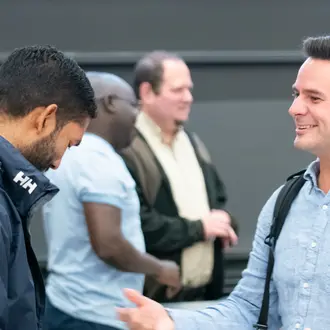Tana Utley, SFMBA '07
Tana Utley, SF ’07, would like to make a pitch for curiosity. In fact, she might say it’s her fuel source, a perspective not to be taken lightly by the woman who leads the production of some of the most powerful engines in the world.Since 1986, Tana has risen through the ranks of Caterpillar, Inc. transitioning through a number of significant roles, including retooling the company’s technology strategy to meet the EPA’s Tier 4 emissions standards. Today, she is vice president, managing the Large Power Systems Division with 5,000 employees across several continents.
But back to her watch word—curiosity. “Curiosity is what has kept me excited and engaged for all these years working at a single company. I love to investigate, explore, learn. How can an engine be improved? How can we grow a great team? What can we learn from the latest technologies? Curiosity is the genesis of progress.” It is also the lifeblood of any Caterpillar team Utley oversees. “It’s important to develop organizations that love to learn and to create value through that learning, which manifests itself in the products we produce. The end result is that we are giving solutions back to society—and that has kept Caterpillar in business for almost 100 years.”
Utley concedes that developing a culture focused on learning has not been a heavy lift at a company dedicated to the care, feeding, and evolution of the reciprocating engine—the power behind mammoth systems like barges, data centers, and oil and gas rigs. “Engineers are naturally curious and eager to find a better way to do things. They’re enthused about putting the latest technologies to the test.” Utley says that she and her team are exploring the frontier of electrification, battery-power, and biofuels with the same excitement that earlier Caterpillar pioneers plumbed the possibilities of the internal combustion engine.
Taking her curiosity to MIT
Of course, Utley’s curiosity is not limited to cylinders and pistons. Her eagerness to unlock the mechanics of microeconomics, the global supply chain, and transformational leadership led her to the MIT Sloan Fellows Program in 2006. She wanted to be a leader with every relevant tool or bit of knowledge at her elbow. In the end, she says, some of the most valuable lessons she walked away with were things she never realized she needed to learn.
One such lesson was the power of diversity. “I knew well the value of racial, ethnic, and cultural diversity before I entered the program. What I was not so aware of was the power of diversity of thought,” Utley says. “There might be two or three or five very different but equally productive ideas on how to tackle a challenge. Collaborating with deeply experienced leaders from so many different countries made me realize the incalculable benefit of taking into consideration new, perhaps unconventional, ways of looking at a problem—solutions that never would have entered my mind.”
Utley says she also discovered the importance of systems thinking. “One act can launch a chain reaction of events. Systems thinking taught me that you can’t predict all outcomes, so you must be ready to course-correct. And you must always identify the root cause of any problem that comes up. Look at all the links in the system, not just the last one. The problem might actually be three or four steps back. I still have my books from systems dynamic class at the ready in case I need them!”
The one-year, full-time model of the MIT Sloan Fellows MBA Program, Utley says, was the ideal platform. “You can learn the tools of management in lots of ways and in lots of places. In my view, it is the immersive aspect of this program that really makes it work. If I’d had to switch on and off between my job and my studies, both would have suffered. As a Sloan Fellow, I could really dig deep into the things I wanted to learn. At the same time, I discovered something wholly unexpected and contrary to my existing mindset—you don’t have to be perfect at everything you do. Sometimes you just need to be good enough. Look at everything on your plate and decide what is good enough—over-achieving can be exhausting, unproductive, and completely unnecessary.”



